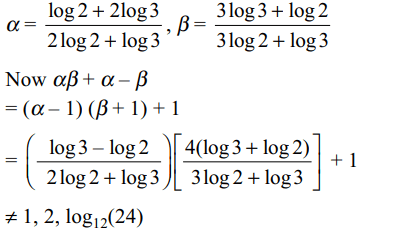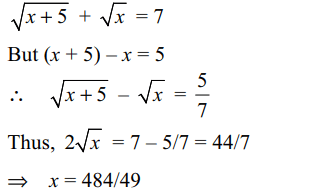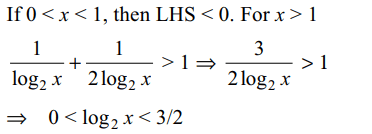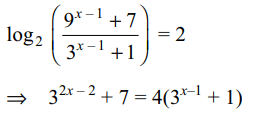1. if \[a^{2}+4b^{2}=12ab\] then \[\log\left(a+2b\right)=\]
a) \[\frac{1}{2}\log\left(\frac{ab}{2}\right)\]
b) \[\frac{1}{2}\log a+\frac{1}{2}\log b+2\log 2\]
c) \[\frac{1}{2}\log\left(\frac{16a}{2}\right)\]
d) \[\frac{1}{2}\left(\log\frac{ab}{16}\right)\]
Explanation:

2. The solutions set the inequality \[\log_{10}\left(x^{2}-16\right)\leq\log_{10}\left(4x-11\right)\]
is
a) \[\left(4,\infty\right)\]
b) \[\left(4,5\right]\]
c) \[\left(11/4,\infty\right)\]
d) \[\left(11/4,5\right)\]
Explanation:

3. If \[\log_{12}18=\alpha \] and \[\log_{24}54=\beta\] then the value of \[\alpha\beta+\left(\alpha-\beta\right)\]
is
a) 2
b) \[\log_{12}24\]
c) 1
d) none of these
Explanation:

4. The solutions set of \[\log_{11}\log_{7}\left(\sqrt{x+5}+\sqrt{x}\right)=0\] is
a) {7}
b) {11}
c) {441/25}
d) none of these
Explanation:

5. If \[\log_{x}2+\log_{x^{2}}\left(2\right)>1\] , then x lies
a) \[\left(1,2\sqrt{2}\right)\]
b) \[\left(2\sqrt{2},\infty\right)\]
c) \[\left(2,\infty\right)-\left\{2\sqrt{2}\right\}\]
d) \[\left(2\sqrt{2},5\right)\]
Explanation:

6. If x satisfies \[\log_{2}\left(9^{x-1}+7\right)=2+\log_{2}\left(3^{x-1}+1\right)\]
then
a) \[x\epsilon Q\]
b) \[x\epsilon \left\{x\epsilon Q:x<0\right\}\]
c) \[x\epsilon N\]
d) Both a and c
Explanation:


7. If \[\frac{\log x}{b-c}=\frac{\log y}{c-a}=\frac{\log z}{a-b}\] then which of the folloe=wing are true
a) xyz=1
b) \[x^{a}y^{b}z^{c}=1\]
c) \[x^{b+c}y^{c+a}z^{a+b}=1\]
d) All of the Above
Explanation:

8. If \[x^{\left(\log_{2}x\right)^{2}-6\log_{2}x+11}=64\] then x is equal to
a) 2
b) 4
c) 8
d) All of the Above
Explanation:

9. If a,b,c are consecuritive positive integers and \[\log\left(1+ac\right)=2k\]
then the value of k is
a) \[\log b\]
b) \[\log a\]
c) 2
d) Both a and b
Explanation:

10. If \[\log_{a}bc=x,\log_{b}ca=y,\log_{c}ab=z\] then the value of
\[\frac{1}{x+1}+\frac{1}{y+1}+\frac{1}{z+1}\]
is
a) 1
b) 2
c) 3
d) 4
Explanation:
